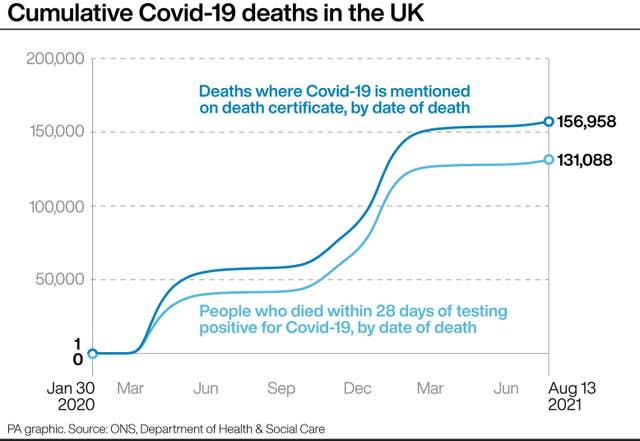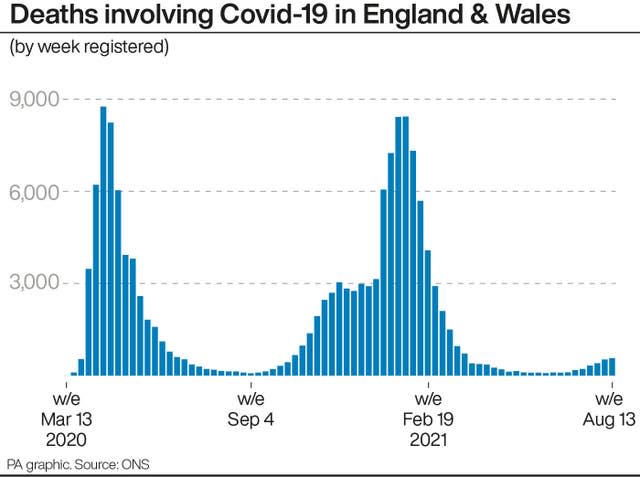Call for booster jab over ‘undetectable’ antibody response in some patients
Two in five people who have impaired immune systems have a “low or undetectable” antibody response after being double vaccinated, a new study suggests.
While the vaccines appear to be active among all adults, the researchers said their data supports a third coronavirus vaccine among groups who had absent or lower level antibody responses.
Vaccination experts are expected to make a recommendation on whether a booster campaign is necessary in the autumn imminently.
The finding comes as weekly Covid-19 deaths are at the highest number since March.
Data from the Office for National Statistics (ONS) show that there were 571 deaths registered in England and Wales in the week ending August 13 mentioned Covid-19 on the death certificate, up 8% on the previous week.

In the latest study, experts from the Universities of Glasgow and Birmingham compared the immune responses between 600 patients with immune-mediated inflammatory diseases, such as those with cancer, inflammatory arthritis, diseases of the kidney or liver, or patients who are having a stem cell transplant, and 231 healthy individuals after they had received both doses of either the AstraZeneca or Pfizer Covid-19 vaccines.
They performed immune tests on blood samples and examined not only antibody levels in the blood but also the ability of a particular form of white blood cell, called a T cell, to respond to the vaccine.
Around three in five people in the vulnerable groups were found to have an antibody response similar to those found in healthy adults.
But 40% of generated a low antibody response compared to healthy people, according to the study which has been published as a pre-print by The Lancet.
And more than one in 10 (11%) failed to generate any anti-spike antibodies four weeks after being double-jabbed.
But the authors stressed that almost all of the people who did not show an antibody response had vasculitis, a group of rare diseases which lead to inflammation of the blood vessels can lead to damage of the tissues.
They said that across almost all patient groups, the T cell response was similar to healthy adults, indicating that some form of immunological response had been mounted, even among those with undetectable antibody levels.
The researchers said that the vaccine is “immunologically active” in all patients but said that their data support an autumn booster campaign among some groups who were found to have a low response.
They added that their study was not a clinical effectiveness study and that work is still ongoing to assess vaccine effectiveness among the most vulnerable.
Trial lead, professor Iain McInnes from the University of Glasgow, said: “The majority of the patients in the Octave trial, actually have mounted an immune response that looks remarkably similar to a healthy control group, 60% or so of our people with these rather significant conditions are in fact looking effectively the same as people who are otherwise have an unimpaired immune system.
“This group who have the slightly lower levels of antibody response… we don’t know what that clinical correlate is and that’s because our trial is not designed to see what does an antibody level mean for your likelihood of getting an infection or the seriousness of that infection should you become infected.
“I think the absence of an antibody response is probably not ideal.
“I would emphasise that the group of patients who did not make antibodies was mostly contained in the vasculitis group, and the vasculitis group is a rare disease group in this country.
“So for the vast majority of people who are who have a solid cancer or have an immune disease, inflammatory bowel disease or arthritis, in fact, the Octave trial says that the large majority of those people are probably going to be fine, but more work is required to be absolutely reassured.”
Asked whether the data supports a potential booster campaign, he added: “Our data suggests that a booster for people who have mounted either an absent or lower level of antibody response would be a very reasonable next step.
“Our view as a group of investigators is that the third inoculation would indeed be a reasonable approach, but we are only one part of the data set that will inform wider policy.”
Co-investigator Prof Carl Goodyear added: “When we look at the T cell responses across all the cohort, they look identical to the healthy controls, so there was a robust T cell response being generated.
“The vaccine is actually immunologically active in all patients, they can mount an immunological response.
“It’s the type of response to the quality of the response, we’re really trying to understand here.”

People with ANCA-Associated Vasculitis, a group of autoimmune diseases which lead to the destruction and inflammation of small blood vessels, had a particularly low response, as measured by blood tests.
The study is still ongoing and researchers aim to gather data on around 3,000 immunocompromised people in total.
Researchers are also planning to extend their study to examine the effect of boosters among clinically vulnerable groups.
The finding comes as vaccination experts are contemplating whether a booster programme is needed in the UK.
In The US and Israel some people are already being offered a third coronavirus vaccine.
Officials are yet to confirm whether this will also go ahead in Britain.
The research was published as the ONS published its data on all deaths registered in England and Wales.
Some 5.5% of deaths, 571, mentioned Covid-19 on the death certificate.
It is the highest total since 719 deaths in the week to March 26.
During the same week some 57 care home residents who died had Covid-19 recorded on their death certificate.
A total of 156,958 deaths have occurred in the UK where Covid-19 was mentioned on the death certificate, the ONS said.


